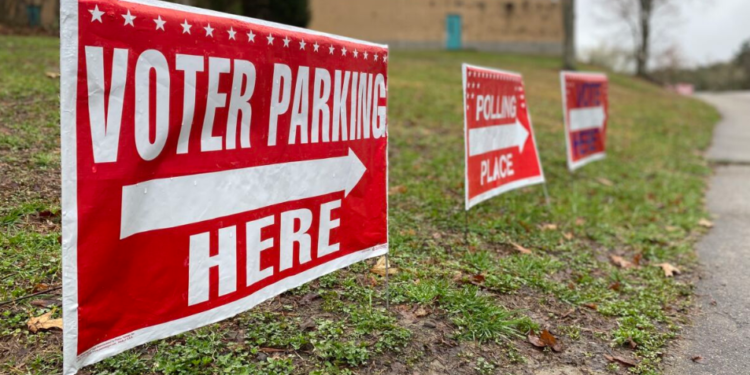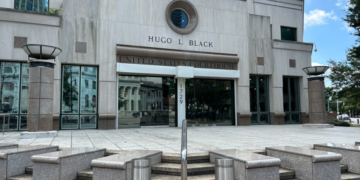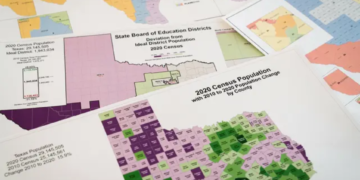March 19, 2025 Story by: Editor
The 4th U.S. Circuit Court of Appeals is set to hear oral arguments on May 9 regarding a lawsuit challenging North Carolina’s law that criminalizes voting by felons in state elections. A federal trial judge struck down the statute in April 2024.
Last fall, the North Carolina State Board of Elections and elected district attorneys filed briefs urging appellate judges to overturn the lower court’s ruling.
The law classifies voting without having one’s rights legally restored as a Class I felony. A 2023 amendment to the statute introduced a condition stating that a felon could only face charges if they knowingly cast a ballot while being aware that their rights had not been reinstated.
“In this lawsuit, Plaintiffs, two organizations that seek to increase voter participation of North Carolina’s Black and low-income communities, challenged the constitutionality of section 163-275(5) of the North Carolina General Statutes. This statute makes it a crime for persons who have been convicted of a felony to vote before their voting rights have been restored,” lawyers from the state’s Justice Department wrote in a November filing at the 4th U.S. Circuit. “Plaintiffs argued that this statute has impeded their mission of increasing voter participation by requiring them to spend time educating volunteers and prospective voters about the statute’s requirements.”
The plaintiffs further contended that the statute violated equal protection rights, claiming it was enacted with discriminatory intent against Black voters. “In asserting this claim, Plaintiffs relied on the fact that the statute allowed for persons to be convicted even when they voted under a mistaken belief that their voting rights had already been restored,” the court filing noted.
Additionally, the plaintiffs challenged the statute’s clarity, arguing it was “unconstitutionally vague.” The filing explained that different district attorneys had varied in their prosecution of individuals who mistakenly believed they were eligible to vote, leading plaintiffs to assert that “the statute lacks adequate guiding standards and is therefore vague.”
While the case was ongoing, the North Carolina General Assembly amended the statute for future elections. “Under the amended statute, persons now can only be prosecuted if they knowingly vote illegally — i.e., by voting in an election knowing their right of citizenship has not been restored,” the court filing stated.
Despite these changes introduced in Senate Bill 747 in 2023, U.S. District Judge Loretta Biggs declined to uphold the law.
“Despite this new enactment, the district court below nonetheless granted Plaintiff’s summary judgment on their claims with respect to the old pre-amendment version of the statute. The court also enjoined enforcement of the pre-amendment version of the statute with respect to theoretical prosecutions concerning past elections,” Justice Department lawyers wrote.
“These rulings were erroneous. As an initial matter, the district court erred by ruling on Plaintiffs’ claims at all because those claims have become moot,” the court filing added. “Given the amendments that have been made to the statute, Plaintiffs lost the concrete interest they once had in this lawsuit’s outcome.”
The filing further argued that plaintiffs’ focus on educating voters about their rights in future elections was no longer relevant because “the portions of the statute that Plaintiffs challenge no longer apply to future elections.”
State attorneys also contended that the claims brought by the North Carolina A. Philip Randolph Institute and Action NC “fail on the merits.” They maintained that the law does not violate equal protection or due process rights. “[T]he prosecutorial decisions that Plaintiffs relied on to support their vagueness claim reflect routine exercises of prosecutorial discretion, not the application of a standardless statute that is unconstitutionally vague,” the filing stated.
Judge Biggs’ ruling on April 22 determined that the felon voting law “was enacted with discriminatory intent, has not been cleansed of its discriminatory taint, and continues to disproportionately impact Black voters.”
Her decision did not affect another statute, NCGS § 13-1, which only allows felons to vote after fully completing their sentences. Under this law, felons who have finished their prison terms but remain on parole, probation, or post-release supervision are still prohibited from voting. The North Carolina Constitution restricts all felons from voting unless their rights have been officially restored.
“The Court holds that the Challenged Statute violates both the Equal Protection and Due Process Clauses of the Fourteenth Amendment,” Biggs wrote in her April 2024 ruling. “Therefore, Plaintiffs’ Motion for Summary Judgment will be granted.”
“Accordingly, Plaintiffs’ requested relief that this Court declare the Challenged Statute unconstitutional and enjoin the enforcement of that Statute are appropriate remedies under the circumstances of this case,” she continued. “As articulated by the Fourth Circuit, ‘the proper remedy for a legal provision enacted with discriminatory intent,’ as is the Challenged Statute, ‘is invalidation.’ And since the North Carolina General Assembly failed to repeal the Challenged Statute, the Court will permanently enjoin further enforcement of that Statute.”
Biggs also referenced the historical background of the statute, noting that it was originally enacted in 1877 with the intent of disenfranchising Black voters.
“Defendants, in an extraordinary and telling concession, ‘do not contest that the historical background from the original enactments of 1877 and 1899 are indefensible. Defendants further do not contest that the law currently impacts African-Americans at a higher rate than it does other citizens,’” she wrote.
She rejected the argument that the 1971 adoption of a new constitution had removed the discriminatory origins of the law, stating that “their argument fails.”
Biggs also criticized the law’s inconsistent enforcement, asserting that “record evidence demonstrating this inconsistency in District Attorneys’ interpretation and enforcement of the Challenged Statute — that some believed that the Challenged Statute included a requirement of intent while others did not — compels the conclusion that the Challenged Statute permits a ‘standardless sweep’ that allows prosecutors to ‘pursue their personal predilections’ under the Challenged Statute.”
The lawsuit was originally filed in September 2020, with plaintiffs arguing that the law forced them to allocate resources toward educating felons about their voting rights. They are being represented by the Southern Coalition for Social Justice.
Following the NC Supreme Court’s April 2023 rejection of a legal challenge to the state’s felon voting restrictions, critics returned to federal court.
A separate case, Community Success Initiative v. Moore, challenged felon voting restrictions (§ 13-1) through the state courts. Advocates sought to restore voting rights to nearly 56,000 felons who had completed their prison sentences but had not finished their full terms.
A divided trial court ruling, later upheld by the state Appeals Court in a 2-1 decision, permitted felons to register and vote in the November 2022 election. However, the state Supreme Court overturned these rulings five months later.
“Our state constitution ties voting rights to the obligation that all citizens have to refrain from criminal misconduct,” wrote Justice Trey Allen for the 5-2 majority. “Specifically, it denies individuals with felony convictions the right to vote unless their citizenship rights are restored ‘in the manner prescribed by law.’ No party to this litigation disputes the validity of Article VI, Section 2(3) of the North Carolina Constitution.”
“This case is therefore not about whether disenfranchisement should be a consequence of a felony conviction,” Allen added. “The state constitution says that it must be, and we are bound by that mandate.”
Instead, plaintiffs challenged laws enacted in the 1970s that dictated how felons could regain voting rights. “The evidence does not prove that legislators intended their reforms … in the early 1970s to disadvantage African Americans, nor does it substantiate plaintiffs’ other constitutional claims,” Allen wrote. “It is not unconstitutional to insist that felons pay their debt to society as a condition of participating in the electoral process. We therefore reverse the trial court’s final order and judgment.”
“The General Assembly did not engage in racial discrimination or otherwise violate the North Carolina Constitution by requiring individuals with felony convictions to complete their sentences — including probation, parole, or post-release supervision — before they regain the right to vote,” Allen stated.
In dissent, Justice Anita Earls criticized the majority ruling. “The majority’s decision in this case will one day be repudiated on two grounds,” she wrote. “First, because it seeks to justify the denial of a basic human right to citizens and thereby perpetuates a vestige of slavery, and second, because the majority violates a basic tenet of appellate review by ignoring the facts as found by the trial court and substituting its own.”
Source: The Carolina Journal

















